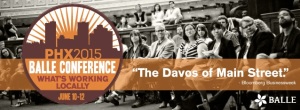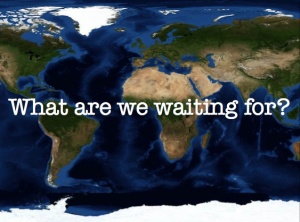MAN in the St. Louis Post Dispatch today!
Posted: 14 Mar, 2016 Filed under: Uncategorized | Tags: Community currencies, Complementary currencies, cooperative, cowry collective, grace hill settlement house, MORE, mutual aid, Mutual Aid Network, Mutual Aid Networks, mutual credit, restorative justice, timebank, timebanking Comments Off on MAN in the St. Louis Post Dispatch today!I’m pleased to report that there’s a big article on Mutual Aid Networks, 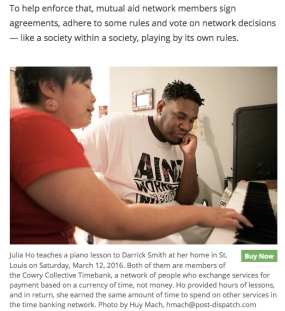 timebanking, and the super cool projects working in both, on the front page of today’s St. Louis Post Dispatch. Hooray!
timebanking, and the super cool projects working in both, on the front page of today’s St. Louis Post Dispatch. Hooray!
Featuring the Cowry Collective, Solidarity Economy Network, Missourians Organized for Reform and Empowerment, Grace Hill Settlement House, Dane County TimeBank and DCTB Youth Courts, and much much more. Check it out!!
MANning Up – from BALLE Conference in Phoenix to Allied Coop Field Trip to St. Louis and New Orleans
Posted: 13 Jun, 2015 Filed under: Uncategorized | Tags: economic justice, Mutual Aid Networks, restorative justice, timebank 1 CommentI’m writing from an airplane on my way back from aptly-named Phoenix Arizona.
Aptly named because the only other time I was in Phoenix, in the ‘90s, I thought it was nothing but hellacious sprawl. But this time I went for the BALLE (Business Alliance for Local Living Economies) Conference and experienced something completely different. I took a fast and cheap light rail train from the airport to a block from my hotel, and was immersed in a really vibrant, walkable, multi-modal transit-having (what envy I have!) sweet and friendly downtown. And I came to understand that this transformation has a lot to do with Local First Arizona, the hosts of this BALLE conference.
There’s a lot more to write about the conference and I bet lots of people will write it more eloquently. So I’m going to say a few highlights and then move on to other news…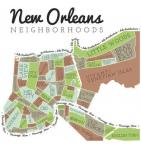
First highlight that isn’t conference related but I just have to mention – I was just treated to a most spectacular view of beautiful craggy mountaintops as we flew over (maybe the Superstitions?). Always get a window seat!
The major highlight of the conference, besides the beautiful people I met and plan to keep in touch with, was its focus on equity. This morning I was moved to tears a few times, especially by Van Jones and Adrienne Maree Brown (I need to buy her book Octavia’s Brood).
I came to the conference to do a 5-minute presentation on Mutual Aid Networks during the Community Capital session. Then spent two 20-minute sessions going in-depth with those who wanted to talk with me. It was really cool. As often happens, I had a few notes of things I really wanted to say during my 5 minutes, then ended up saying completely different things. But it seemed to work out OK, and I made some very fruitful connections with people who seem likely to pilot and partner with us.
And now I’m on my way home, having left the conference slightly early because tomorrow my band Ladyscissors has an out-of-town show and then Sunday we leave for the Allied Community Coop learning and skill-share FIELD TRIP!!! I’m very excited.
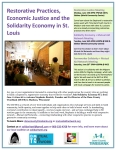 Five leaders of the Allied Coop (4 board and 1 new staffer) will travel to St. Louis and New Orleans to learn and share about cooperatives, mutual aid networks, timebanking, mutual aid societies (African-American tradition of money-pooling for mutual support, pre-cursor to modern insurance which coopted the model for profit), and more. Including the Neighborhood College program that my friend Renee Marver helped run at the MORE Timebank in the 80s and 90s, the first modern timebank in the US.
Five leaders of the Allied Coop (4 board and 1 new staffer) will travel to St. Louis and New Orleans to learn and share about cooperatives, mutual aid networks, timebanking, mutual aid societies (African-American tradition of money-pooling for mutual support, pre-cursor to modern insurance which coopted the model for profit), and more. Including the Neighborhood College program that my friend Renee Marver helped run at the MORE Timebank in the 80s and 90s, the first modern timebank in the US.
All this is on the heels of last Friday’s soft launch of the Main MAN, our umbrella Mutual Aid Network. So we’re starting to get real. And it feels great!
I’ll sign off now to get a little rest in the midst of this whirlwind couple weeks, but I thank you for reading and look forward to sharing more later.
Time to get ready to shape and enjoy the beautiful new world we’re all working hard to create. I’m proud to know you!
Updates – last tour, next tour, more progress on the MAN, money, life, etc
Posted: 17 Sep, 2013 Filed under: Uncategorized | Tags: Community currencies, Complementary currencies, cooperative, ecological economics, fair economy, giftival, mutal aid networks, mutual aid, mutual credit, sharing economy, timebank, timebanking, tour Comments Off on Updates – last tour, next tour, more progress on the MAN, money, life, etcHello
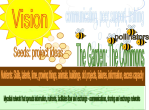 There’s a lot to write – but there’s a lot of everything to do, so as usual I’ll do what I can and go back and flesh things out later. There’s a lot of video and audio content from various presentations and gatherings to sort through and post, but it takes time and people to do it. You can see the ways I’m starting to flesh things out and seek help with them in the Time For the World 2013 proposal. We’ll soon be making the first informal Mutual Aid Network functional enough to seek contribution of skills and other resources on that platform.
There’s a lot to write – but there’s a lot of everything to do, so as usual I’ll do what I can and go back and flesh things out later. There’s a lot of video and audio content from various presentations and gatherings to sort through and post, but it takes time and people to do it. You can see the ways I’m starting to flesh things out and seek help with them in the Time For the World 2013 proposal. We’ll soon be making the first informal Mutual Aid Network functional enough to seek contribution of skills and other resources on that platform.
And a lot of what I’m busy with is getting ready for the 3rd and last leg of my Dreamworld Sharing Economy tour, which starts this Thursday! I’m posting details here, but in a (long!) nutshell:
I start with a trip to Chicago, seeing the premier of Broken Fences, directed by my good friend Ann Filmer. Friday we do skill shares and a sharing economy discussion in Evanston, then Trade School Evanston/CTX Collaboration Launch Party where we celebrate the new collaboration between the Chicago Time Exchange and the Evanston Trade School, and I play some music along with other local artists.
The next day a timebank picnic in Lansing, Michigan and that night a show in Detroit at a great venue, Trinosophes, at a benefit for local radio station WHFR. Cool! The next day a timebank gathering, a potluck, that Monday a lunch meeting with Detroit city managers. Wed. I’ll attend the launch of the new Pontiac Michigan TimeBank! Thur. I play in Canton Ohio, Friday I have an evening event with the Kent Community TimeBank, Saturday a daytime training with Kent folks (with Abby Greer!) then a show in Akron that night.
On to Ithaca New York to meet with Scott Morris and other sharing economy, Ithaca hours, Ithaca timebankers folks. Then to Amherst to talk with Emily Kawano of Solidarity Economy Network.
Really exciting things in the northeast – Boston for 2 great events on Oct. 1, Dartmouth for 2 great events Oct. 2, Providence Rhode Island to see the amazing Lisa Conlan and New Hope Care Exchange, a show in Brooklyn Oct. 4, NYC current timebanking practitioners training Oct. 5, new timebank training in Media PA Oct. 6. Oct 7 + 8 I’ll work with the great Kathy Perlow (Lehigh Valley Care Exchange) on making training materials and video about Neighbor-to-Neighbor Care Teams (which we’re making here in Dane County so I really need to know!). October 9 I’ll take a train to Newark and then fly to Istanbul Turkey for GIFTIVAL!
Upon my return I’ll work with Paul Glover (founder of Ithaca Hours and much more) to learn about and document his efforts and brainstorm about connections between cooperative economic models and practices (which I need to learn about as we’re doing this here in Dane County). Then gathering with timebank, Bnote, and other interested folks in Baltimore, doing some events with the legendary Edgar Cahn in Washington DC and nearby, and working with Edgar and other organizers to document community and racial justice initiatives happening there, and create learning materials on the topic.
I play a show in DC Oct. 25 then hightail it to Tampa Bay for timebank events on Oct. 27 and 28, then hightail it to New Orleans for a timebank gathering Oct. 29. Will stay through Halloween, then to St. Louis for a timebank gathering and show Nov. 2.
Then I’ll be happy to return home and buckle down to build our local MANs.
Yesterday I met with a fantastic lawyer specializing in cooperative law. He will help us build a great MAN, one that can easily spin off others at all different scales. We can make it work and he will help. I’ll be working on Articles of Incorporation over the next few weeks and get it going for real upon my return in November.
And all this is in addition to, in support of, and due to the beautiful developments within and around the Dane County TimeBank as we embark on our PowerTime II energy project with the Allied Community Coop, build neighbor-to-neighbor Care Teams in Sun Prairie, build on our youth court successes by creating our first adult peer court!, connect with more economic tools to increase our impact and improve our sustainability, etc etc. We have a great staff, including Co-Director (promoted from Asst. Director last year) Lorrie Hurckes, who make it possible for me to travel so much this year and who along with our members make all the great stuff happen.
we embark on our PowerTime II energy project with the Allied Community Coop, build neighbor-to-neighbor Care Teams in Sun Prairie, build on our youth court successes by creating our first adult peer court!, connect with more economic tools to increase our impact and improve our sustainability, etc etc. We have a great staff, including Co-Director (promoted from Asst. Director last year) Lorrie Hurckes, who make it possible for me to travel so much this year and who along with our members make all the great stuff happen.
Speaking of making great stuff happen, we had a lovely anonymous donor come through with $10,000 for us, which unlocked $10,000 of our $20,000 challenge grant from Kailo Fund. Hooray! We’re looking for $11,500 more to fund the rest of our year. More gets us more possibilities to commission more work from more people so don’t be shy about giving HUGE amounts. You can donate here to support the tour, or donate to the general Time for the World fund here.
We have a lot of work to do and would love to have your feedback, moral support and/or contributions.
Thanks for reading!
–Stephanie
On Good Work
Posted: 15 Jul, 2013 Filed under: Uncategorized | Tags: Community currencies, community development, Complementary currencies, cooperative, ecological economics, fair economy, good work, mutual credit, new economy, timebank, timebanking, work, work redesign Comments Off on On Good Work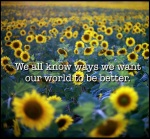 While much of Time For the World’s focus has broadened to be about redesigning work at human scale, and most of the public talks I’ve done over the last six months or so have emphasized this, I realize that I’ve posted very little about it so far. Paradoxically, that’s because work redesign has become so important to our efforts and thinking that it’s taking us a long time to write it all up how we want to. But I want to share some thoughts with you now as we move toward making good work a way of life.
While much of Time For the World’s focus has broadened to be about redesigning work at human scale, and most of the public talks I’ve done over the last six months or so have emphasized this, I realize that I’ve posted very little about it so far. Paradoxically, that’s because work redesign has become so important to our efforts and thinking that it’s taking us a long time to write it all up how we want to. But I want to share some thoughts with you now as we move toward making good work a way of life.
There’s an infinite amount of work to do, to repair the destruction we’ve wrought and build new life-sustaining and regenerating systems and structures. There are not an infinite number of ‘jobs’ to be had, let alone an infinite number of jobs being offered that don’t contribute to the wholesale destruction of our planet and its living communities. Reducing unemployment by bolstering a cannibalist economy is not a worthy goal.
In our experience with economic redesign work we’ve realized that it’s very easy to become heavily tool-focused, obsessing about accounting and currency design while forgetting to evaluate the ends to which we’re designing. We’ve seen a need to continually, explicitly draw attention and design principles to human and community outcomes, and only think about boosting economies if they’re providing good work. Even more important, we see a need to use economic tools to pull parts of life out of the transactional economy and back into the commons.
We’ve recently figured out some ways we can combine various tools and approaches – namely, a cooperative ownership structure, principles of co-production and commons governance, project facilitation training and support combined with timebanking, price-based mutual credit and cooperative saving/lending/investment models – to build a system that pools and allocates resources as an engine for generating and rewarding good work.
Good work should be fun and creative. Good work should provide the opportunity for people to do what we’re passionate about, or simply enjoy, or enable us to take a slower pace if we choose. A good system will create incentives for people to contribute to their communities and commons in the ways that play to their strengths. Peer support in co-productive networks will provide guidance in making cooperative decisions and carrying out successful projects that help people to fulfill their goals, sharing successes and failures for mutual learning along the way.
We think we can design this by doing it. We’ve set up a bare-bones Mutual Aid Network so we can commission work from each other in building an infrastructure, offering each other time credit to start and working toward adding broader resource pooling and exchange mechanisms. And I’ll be meeting with people around the country, during my Sharing Economy Tour, to hammer out legal issues, financial structures, potential partnerships, and learn ways people would like to apply this thinking in the field. We’d love for you to help shape this if you’re interested. Start by signing up at the Mutual Aid Network and we’ll collectively take it from there.
Thanks!
Much more to come
–Stephanie
Time for the World – in a new book, other updates
Posted: 29 Nov, 2012 Filed under: Uncategorized | Tags: cooperative, fair economy, gaming, timebank Comments Off on Time for the World – in a new book, other updatesHello!
Sorry for the little lapse in writing posts, I needed some time to recover from all the activity in October and to set some other stuff in motion here. Here’s your report.
We’re dreaming big now here at Time For the World but I won’t be telling you about that now, I need time to write it up in a coherent form and share it properly. Stay tuned! We’re excited about the possibilities…
And in more immediate news: I wrote a piece that’s appearing in Slow Investing: How Your Money Can Transform the World, a book edited and introduced by John Bloom of RSF Social Finance and also featuring Woody Tasch of Slow Money, John Fullerton of the Capital Institute, and many more. I’m honored to be in their company! At the printer now, order it here.
At the printer now, order it here.
Next Builders Workshop is Thursday December 13, 4-6pm CST, where we’ll focus on the possibilities that can open up when we connect timebanking with cooperatives. We hope and plan to start living them out here in Dane County and this will help us learn how! We welcome you to join online. We have a less-than-streamlined somewhat graceless way to do it that seems to work. Email steph@stephanierearick.com with as much advance notice as possible (at least 24 hours please) if you’d like to join from afar.
The one after that will focus on TimeBanking and Community Justice, January 17 4-6pm CST. We’re excited to host our friends from city, county and state law enforcement and human service organizations to highlight how our partnerships are working to create more community restorative justice opportunities and build our capacity to keep our own communities safe and healthy. And even more excited to show how we’re planning to expand on those and find new ways to work together to build a better justice system. We’re also working on ways to help other communities replicate and build on work we’re doing here.
Bear with me for just a couple more things, I know this is getting long…
————————————————————————
Knit a Network is a process that I’m helping to facilitate, to pull together timebankers around the world (most participants are US-based but we also have folks from S. Africa, Europe and Turkey and will hopefully be gaining a few more folks from other areas soon), in addition to people working in related areas such as mutual credit, permaculture and transition movements, to build a better sharing and support infrastructure. It’s going well, especially considering the enormity of the task. Our last call for our initial 90 day process (we took it on as a 90-Day Challenge when Edgar Cahn was suggesting the concept to individual timebanks) is Tuesday Dec. 4. By that date you’ll be able to see the work in progress (some is there now, some we’re working on until that day) at the group’s temporary Knit a Network website. Part of the group’s process is to figure out the more permanent homes and stewards for the work and how we can build systems that streamline sharing among them. Stay tuned to see how it develops, or better yet, participate!
This Saturday the Dane County TimeBank co-hosts the Madison Hours Holiday Trade Fair. Vendors will take Madison Hours and dollars in whatever combination they choose – some may take timebank hours too. And the Dane County TimeBank is hosting a swap meet where people can trade stuff, Madison Hours or checks from their timebank accounts, whatever they like and whatever feels fair. We’ve started to do this regularly lately and it’s really fun! And gives folks a chance to practice living in a different kind of economy.
and taking that deeper, we’re starting to get the Build a Better World Game out into the world. It’s finally in a more shareable form, still to be improved in the coming weeks. We’ll play in a number of settings, do some of the activities in real life, and continually improve upon the game. Or rather, players will continually improve upon the game. We’re playing here on Friday December 7 and will let you know how it goes. We’ll be taking lots of pix and video.
Look for a post in a couple weeks that’ll share that experience, point you to where you can get a better-put-together (than what I have right now, which is useable if you want it sooner) version of the game to check out yourself, and share our new ideas and plans.
Thanks for reading!
–Stephanie
ps feel free to pass this on to folks you think would be interested, and encourage them to sign up for the RSS feed if they like it so they can get an email when we post new stuff
Sharing Builders Workshop #7: Healthy Community Economy Part II
Posted: 23 Oct, 2012 Filed under: Builders Workshops, Presentations, Uncategorized | Tags: Community currencies, community development, Complementary currencies, conference, cooperation, cooperative, ecological economics, mutual credit, timebank, timebanking Comments Off on Sharing Builders Workshop #7: Healthy Community Economy Part IIHello!
Builders Workshop #7: Healthy Community Economy Part II was a great wrap-up of our explorations, from the Healthy Community Economy Part I workshop as well as the intervening Economic Democracy Conference, of how multiple currency/cooperative economic models could work in concert to achieve powerful community goals. In the Economic Democracy Conference open space Action Summit session we applied this thinking to the outcome of food security.
In Builders Workshop #7 we applied similar thinking and modeling to the goal of reduced fossil fuel consumption.
We had 14 people in attendance. While smaller in number than other Builders Workshops, this group proved to be a perfect size and makeup for the work that we needed to do. I was particularly excited that David Boetcher, an IBEW electrician who co-presented (with Justice Castaneda of MIT Colabs and Chris Meyer of Sector67 co-working space) the New Approaches to Science and Industry workshop at the Economic Democracy Conference, attended and contributed his knowledge of energy systems, surrounding economies and potential partners.
First we gave a slide presentation that recapped and expanded on pieces from Healthy Community Economy Part I.
It’s shared here.
Then we decided to use a case study of a hypothetical community goal in order to see how we might apply different cooperative economic tools to different pieces of the systems we’d need to affect to achieve our desired outcome. The group chose reduced fossil fuel consumption as the focus area. This is what we came up with, sort of a general map of where each piece would be employed to corral various types of resources, finishing with people taking on pieces to research/explore potential partnerships. 

 In the rough maps in the first and second slides M$ stands for Madison Hours and/or price-based mutual credit; T$ stands for timebank hours. The first map was the brainstorm, the second was an attempt to show some chronological representation of how you would develop the project.
In the rough maps in the first and second slides M$ stands for Madison Hours and/or price-based mutual credit; T$ stands for timebank hours. The first map was the brainstorm, the second was an attempt to show some chronological representation of how you would develop the project.
As you’ll see from the third photo, we were blessed with participants who offered to carry some work forward! So some of us will be researching existing renewable energy/efficiency efforts, some will research JAK-style bank community saving and lending possibilities, some will be meeting with local businesses to pursue price-based mutual credit and Madison Hours possibilities, and some will be meeting to explore a potential energy project here in Madison.
Stay tuned for further developments…
And follow it all on Build For the World (and post your own projects there – we need to learn from each other!), http://buildftw.org
Thanks for reading,
Stephanie
Deploying Time Banking for Human-Scaled Economic Development: Video
Posted: 7 Apr, 2011 Filed under: media, Presentations, Uncategorized | Tags: Community currencies, community development, conference, ecological economics, hierarchies, networks, timebank, trophic analysis 1 CommentIn February we gave a presentation at the International Conference on Community and Complementary Currencies in Lyon, France. Here is video and our slideshow from that presentation. Let us know what you think! We continue to build on and advance on this work as part of the project.
It is best viewed full screen.
Connecting the dots in Madison, Wisconsin
Posted: 13 Mar, 2011 Filed under: Uncategorized | Tags: LETS, mutual credit, public banks, state banks, state-owned banks, timebank Comments Off on Connecting the dots in Madison, WisconsinStephanie gave a speech at the International Women’s Day Rally at the Capitol protests in Madison, Wisconsin (home of Time For The World) on March 8, 2011. If we want an economy that works for people we need to address the mechanics of money itself. Mutual credit! Public banks!
Watch the video:
https://www.facebook.com/video/video.php?v=10150112255914667
Talking Timebanking on Pacifica Radio
Posted: 17 Feb, 2011 Filed under: media | Tags: interview, media, timebank Comments Off on Talking Timebanking on Pacifica RadioStephanie Rearick, TFTW Project Coordinator, talked about timebanking, human-scaled economies and the Time For The World project on Pacifica radio on Feb. 8. Steph comes on at about 40:30 in, but the whole show is interesting if you have time.
In two new monologues, Mike Daisey examines what money does to human relations and reveals the human cost of our love affair with electronic gadgetry. And Stephanie Rearick describes a system of alternative currency called TimeBanking.
Against the Grain – February 8, 2011 – or download mp3 or play from KPFA
